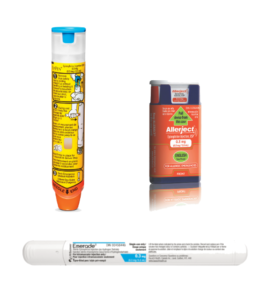Ask the allergist is a regular feature in our newsletters where Dr. Julia Upton answers your questions!

Dr. Julia Upton is a Canadian allergist who is on staff at Toronto’s SickKids Hospital in the Immunology and Allergy Department. She is an Associate Professor in the Department of Paediatrics at the University of Toronto and is the past Section Chair of Food Allergy and Anaphylaxis with the CSACI. Dr. Upton is also a member of our Healthcare Advisory Board.
Please note: Dr. Upton is answering as an individual allergist and her answers do not constitute an official position of her affiliated organizations. Her responses are for informational purposes only and do not constitute specific medical advice, recommendations, diagnosis, or treatment. Please talk to your doctor about any concerns or questions you may have regarding your own health or the health of your child.
In this month’s article, we’re covering the use of an epinephrine auto-injector and visit to the emergency department (ED) during the pandemic. A question about this was asked a year ago and the same answer applies.
As parts of Canada enter the third wave of COVID-19, should I still call 911 and go to the ED after using my auto-injector to treat anaphylaxis?

This is an important question, one which requires an answer from your physician who is familiar with you and your medical history. Normally, a dose of epinephrine is given, 911 or the emergency service in your area is called, and you would go to the hospital.
To reduce the burden on EDs and to reduce the spread of the virus, national allergy societies have suggested that allergists could advise that in some cases, food-related allergic reactions could be managed without going to the ED. Such an approach would only be considered for people whose symptoms immediately and completely resolve after one dose of epinephrine. This means the person is completely better within five minutes after receiving their epinephrine auto-injector. If not, calling 911 and a trip to the ED is warranted.
To determine if temporarily changing the management advice for food allergic reactions is right for you, please discuss with your physician prior to a reaction.
Note from Food Allergy Canada:
If you/your child have a food allergy, be prepared for an emergency by having in-date epinephrine auto-injectors on hand.
Do you have a question you’d like to ask Dr. Upton in the months to come? If so, please send it along to us at info@foodallergycanada.ca. Please note: Dr. Upton answers questions on general topics, please talk to your doctor if you have questions about your own health or the health of your child.
Tags: ask the allergist, dr upton
